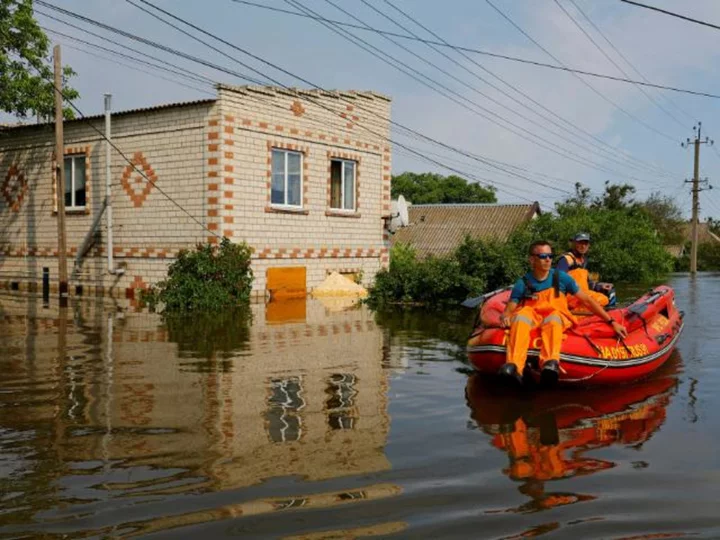Floodwaters are receding following the collapse of the Kakhovka dam, but debris washed along the Dnipro river is turning Odesa's Black Sea coastline into "a garbage dump and animal cemetery," according to Ukrainian authorities.
"A lot of mines, ammunition and other explosive objects are being carried into the sea and thrown onto the shoreline," Ukraine's Ministry of Internal Affairs said on its website at the weekend, adding that border guards had observed a "plague of fish" in the area.
"The Dnipro river flows into the Black Sea, bearing many signs of the devastation caused by Russians," the ministry said.
"The consequences of ecocide are terrible," it added.
The collapse of the dam in southern Ukraine on June 6 is one of the biggest industrial and ecological disasters in Europe for decades. The catastrophe has destroyed entire villages, flooded farmland, deprived tens of thousands of people of power and clean water, and caused massive environmental damage.
But it's still impossible to say whether it collapsed because it was deliberately targeted as part of Russia's war in Ukraine or whether the breach could have been caused by structural failure. Several Western officials have blamed the collapse of the Russian-occupied dam on Moscow.
A total of 2,699 people, including 178 children, have been evacuated from endangered settlements in the Kherson region since the collapse, the Ukrainian head of the regional military administration Oleksandr Prokudin said in a Telegram post on Saturday.
Swimming, fishing banned
Swimming and fishing have been banned in the region and people are being advised to drink only bottled or imported water, Prokudin said.
Meanwhile thunderstorms and squall winds expected on Sunday mean "volunteers will not be allowed to perform any rescue operations," he added.
"The concentration of harmful substances in water samples is ten times higher than the permissible norm," Prokudin said.
Prokudin said the area of flooded territories in Kherson region had "decreased almost by half" and the average water level had decreased by 27 centimeters (0.9 feet) to 4.45 meters (14 feet).
However, "32 settlements on the west bank of Dnipro river are still flooded and 3,784 residential buildings are under water," he said.
Prokudin also described the situation on the "temporarily occupied east bank" as "critical."
"Now 14 settlements are flooded there. The (Russian) occupation authorities are not carrying out evacuation measures," he added.
Call for international support
The developments came as Ukrainian President Volodymyr Zelensky called for international support to help rescue victims of the dam collapse in Russian-occupied areas of Ukraine.
"Russia does not provide any real help to the people in the flooded areas" that are under its occupation, Zelensky said in his nightly address on Saturday.
"In the occupied territory, it is only possible to help people in some areas -- Russian terrorists are doing everything to make the victims of the disaster as many as possible. Russian shelling continues -- even at evacuation points," Zelensky said.
The Ukrainian leader has previously accused Russian forces of shooting at Ukrainian rescuers trying to reach flooded areas in the Kherson region that are under Russian control.
"We are pressing and encouraging so that international organizations and international support come to the part of Kherson region where the occupiers are now," Zelensky emphasized in his Saturday address.
The Ukrainian president said "over 3,000 people have already been evacuated in Kherson and Mykolaiv regions" following the dam collapse -- but that was only in the "free territory under our control."
On Saturday, the Russian Foreign ministry released a statement blaming the dam's collapse on "methodical attacks of the Armed Forces of Ukraine."
It claimed that "regular attacks" on the Kakhovka Hydroelectric Power Plant from Ukrainian armed forces "led to the destruction of its structures and the uncontrolled discharge of water from the Kakhovka reservoir downstream of the Dnipro river."
Far-reaching impact
The impact of the dam collapse has been felt far beyond the Kherson region.
In addition to the Black Sea coast, in the Dnipropetrovsk region, the Marhanets, Nikopol, Pokrovsk and Hrushivka communities have been partially left without water supply, Ukraine's Ministry of Internal Affairs website reported Sunday, while a "whole section of a railway track was destroyed near Nikopol, according to the Ukrainian rail authority.
In Mykolaiv, access roads to the village of Afanasivka, where 379 residents live, have been completely cut off, the State Emergency Service of Ukraine reported.
Meanwhile, during a visit to Ukraine Saturday by Canadian Prime Minister Justin Trudeau, Zelensky offered his country's assistance in fighting the wildfires that have consumed many parts of Canada.
"Of course, we will not stay away from the disaster Canada is facing now," Zelensky said.
"Massive wildfires, colossal environmental losses, and threats to people... Ukraine is ready to help extinguish fires if Canada needs such international assistance."
"Our Ukrainian sense of international relations is precisely in the fact that we should always take care of each other when support is needed. And really help," Zelensky said.









